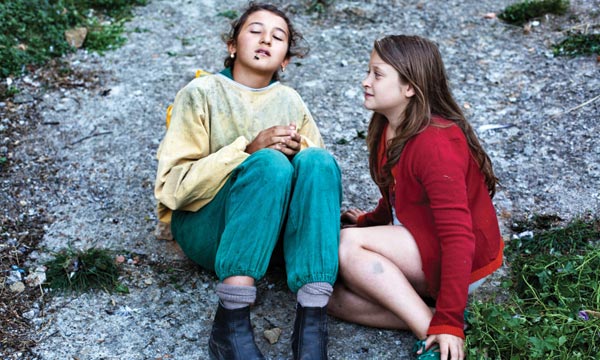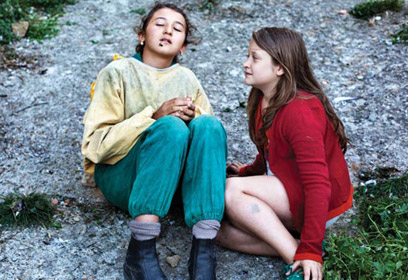
Maria Alexandra Lungu plays Gelsomina, left, and Agnese Graziani her sister Marinella in Alice Rohrwacher’s The Wonders. / Photograph: Tempesta
The Wonders
directed by Alice Rohrwacher
Tempesta
Alice Rohrwacher has unexpectedly taken the Grand Prix at Cannes with only her second feature film. Interviewed after receiving the award, the young auteur was asked whether The Wonders was autobiographical—an obvious question since, like the family portrayed in the film, Rohrwacher’s Italian mother and German father were beekeepers. Rohrwacher had a subtle and intriguing answer: the film was personal but not autobiographical. That distinction is indicative of the psychological acuity on display everywhere in this delicate, impressive work.
Like Heavenly Body (Corpo celeste, 2011), The Wonders features a young girl’s coming of age. Maria Alexandra Lungu plays the sensible, dark-haired Gelsomina, the oldest of four sisters. We share some of her experiences during the summer she crosses the threshold into adolescence, but what we see on screen is not so much a coherent narrative as a collage of events, feelings, and imaginings that will later become sorted into memories. With this technique, Rohrwacher has clearly moved on from Proust’s remembrances of the past. The Wonders may be personal, but, with its deep psychological understanding, it also touches on the universal. We all edit—often without realizing it—the blooming, buzzing confusion of childhood experiences and make them into fables: a life story, our sense of who we are.
The characters and scenes enacted in Gelsomina’s little world are therefore products of her psyche, not their own backstories. Her father Wolfgang (Sam Louwyck) and her mother Angelica (Alba Rohrwacher, the director’s sister) are what they seem to be to Gelsomina. Wolfgang is at times cruel, arbitrary, and domineering to this girl on the verge of asserting her own will but still desirous of his love and approval. She wants to be his respected partner in the beekeeping business, and she seems to be more knowledgeable about it than he is. This levelheaded young woman may even be the head of the family; at moments in the film everyone looks to her as though she is.
• • •
In the first of what seem to be two beginnings, we see mysterious lights emerge from the darkness. Two SUVs carry hunters and their dogs into the hinterlands of the predawn Tuscan landscape. One of the hunters is surprised to see a derelict house nearby, but his friend says it has always been there. Thus begins the fable of the house that was Gelsomina’s home.
In the second beginning, we enter the darkened structure as it comes to life. We hear the bossy Gelsomina complaining as her younger sister Marinella (Agnese Graziani) gets out of bed. Marinella says she has to pee, but Gelsomina suspects that she plans to sneak into her parents’ bed once again. A chubby Marinella sits on the toilet, not only peeing but triumphantly squeezing out some poo. This is not the usual sentimentalized female coming-of-age film. Rohrwacher reaches back into Italian neorealism and gives it her own spin. We have every reason to believe that Gelsomina will no longer allow herself to get in bed with her parents; still, she is jealous of Marinella. The two youngest sisters, wearing only bikini bottoms, attend the nighttime gathering around the toilet.
We all edit—often without realizing it—the blooming, buzzing confusion of childhood into fables: a life story, our sense of who we are.
How this family came to live in the derelict home is never explained. Subsequent events suggest the parents come from a back-to-nature commune of the sort that flourished in the 1960s. Wolfgang is keen on living off the land and preserving their remote area of Tuscany from the degradation of tourists and hunters “who shoot things.” The narrative ambiguity results from Rohrwacher’s focus on Gelsomina’s subjectivity—not only how the girl sees and feels what is happening, but also what she might not know about her parents’ past.
The film spends a lot of time on the drudgery of beekeeping. Each day the hives must be harvested and moved. The bees swarm and leave the hive; Gelsomina and her father have to retrieve them. Gelsomina climbs a tree and directs her father. Bees die of what her father thinks is the plague, but Gelsomina knows better: the culprit is a new insecticide local farmers have been using. In all this Gelsomina works at least as hard as her father and seems to have his respect. What Angelica does, besides running around barely dressed most of the time, is apparently of little interest to Gelsomina. We never see her preparing the meals for the seven mouths that need feeding. In addition to the family, there is Cocò (Sabine Timoteo), a woman whose presence is never really explained.
One afternoon Wolfgang interrupts the daily work and takes everyone to a nearby lake for a swim. The family’s noisy and happy play attracts a man dressed in city clothes with his pants rolled up. He asks them to be quiet; they are shooting a television show. Gelsomina follows the man back to the shoot and beholds the beautiful Milly Catena (Monica Bellucci) clothed like a goddess in white with a magnificent headdress. (Bellucci also appears in the latest James Bond film Spectre, but she is far more beautiful in The Wonders.) In Gelsomina’s spellbound fable, Milly Catena is Cinderella’s fairy godmother. She represents the world of glamor that Gelsomina knows only from television. Milly places a piece of her headdress in Gelsomina’s hair, and the girl is smitten.
The television people are planning a contest on an Etruscan necropolis in the middle of the lake to find the most authentic rustics of rural Tuscany. Gelsomina wants her family to enter. The winners will get money and a trip, but Wolfgang wants nothing to do with the corruption and superficiality of TV, despite the family’s desperate need for money. To prove his disdain he sells the small herd of sheep kept on their land and buys a camel as a gift for Gelsomina and her sisters. The camera seems to take pleasure in every move the creature makes. Now the family is in desperate straits, so it is a momentous rite of passage when Gelsomina disobeys her father to secretly enter her family in the contest.
Another rite of passage stirs when a German juvenile delinquent, Martin (Luis Huilca), arrives with his social worker. Wolfgang has taken him on for the money and to help with the work. Angelica is worried for her girls. Through Gelsomina’s eyes the boy is shy; he refuses to speak but whistles marvelously. Gelsomina befriends him and teaches him about beekeeping. Her friendship with him is as innocent as her worship of Milly.
Rohrwacher films her way into Gelsomina’s psyche. Without any backstory we see Gelsomina and Marinella at play: acting, singing, dancing. There is a lovely moment when, at Gelsomina’s direction, Marinella cups her hands and pretends to drink a beam of light.
In another scene, again without all the details, we see Marinella get hurt. Gelsomina may have started the centrifuge for the honey before Marinella could get her hand out. Marinella is cut and needs stitches. This might be a moment of spitefulness that the girl cannot fully acknowledge. When the axe of parental judgment might fall, Marinella defends her older sister.
The moments in Gelsomina’s summer are drawn together in two endings. In the first Gelsomina’s family does enter the television contest. Millie presides and interviews the contestants, who are dressed in hokey Etruscan costumes under the bright television lights. When Wolfgang is up, he says the world is coming to an end. Millie backs away, but Gelsomina boldly holds her and says that she and the German boy have a little show to perform. Out of her mouth crawl two bees that move across her face without stinging her, and out of the boy’s mouth comes that remarkable whistle. After the children’s show, Cocò tries to force the children to kiss each other. (This may finally explain why Cocò has a place in Gelsomina’s life story.) The boy runs off and cannot be found that night. Everyone leaves the island on boats.
The second ending takes place the next day when Gelsomina insists that she can find him. On a note of magical realism, she makes her way back to the island on a surfboard. She does find him; we see the teens sleeping next to each other. One might assume they have had sex, but to her family’s amazement—and to ours—she has learned to whistle like the boy.
Though it subverts the typical female coming-of-age story, The Wonders enchants as it draws on reserves of empathy and compassion you did not know you had. And Rohrwacher does not forget how her fable began: the last shot is of the house that was a home, now empty. What has happened to Gelsomina’s family is as mysterious as the lights that opened the film.







